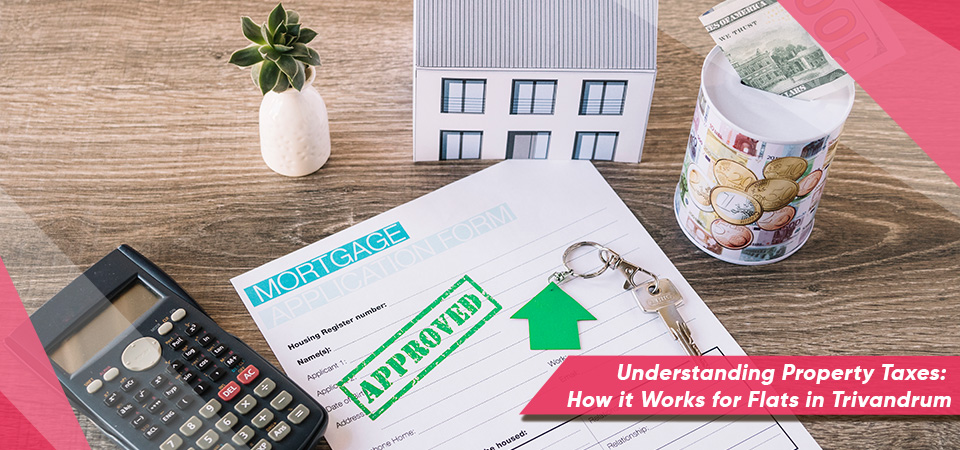
Blog Detail
Understanding Property Taxes: How it Works for Flats in Trivandrum
Posted onOct 11, 2025
Investing in real estate can be one of the most rewarding decisions if done strategically, and understanding property taxes is a crucial part of this journey. Whether you are a first-time buyer or a seasoned investor, knowing how property taxes are calculated for flats in Trivandrum can save you from unexpected expenses. For those exploring Real Estate Investment Strategies in Trivandrum, mastering property tax calculations ensures smarter financial planning and better returns in the long run.
Understanding Property Tax in Trivandrum
Property tax is a levy imposed by the local municipal authorities on the ownership of property. In Trivandrum, the property tax applies to residential and commercial flats, and it is calculated based on factors such as the property’s location, size, age, and usage. Municipal corporations use these taxes to maintain infrastructure, provide civic amenities, and improve public services, making it an essential contribution from homeowners.
Key Factors Affecting Property Tax Calculation
Several factors influence the property tax for flats in Trivandrum:
- Property Location: Properties located in prime areas or central parts of Trivandrum typically attract higher property taxes due to better infrastructure, connectivity, and access to civic amenities.
- Built-up Area: The size of your flat, measured in square feet or square meters, directly impacts the tax amount. Larger flats naturally incur higher taxes.
- Property Type and Usage: Residential and commercial properties are taxed differently. Moreover, properties used for rental or business purposes may have higher rates compared to owner-occupied flats.
- Age of Property: Older properties may receive depreciation benefits, resulting in relatively lower property taxes.
- Municipal Rates: The local municipal corporation determines tax rates, which may vary across different wards and neighborhoods within Trivandrum.
Step-by-Step Property Tax Calculation
Calculating property tax can seem complicated, but understanding the process makes it easier to plan your finances. Here’s a general approach used by Trivandrum’s municipal authorities:
- Determine the Annual Rental Value (ARV): Municipalities often calculate property tax based on the notional rent the property could fetch annually. This is known as the Annual Rental Value.
- Apply the Tax Rate: Each municipal ward has specific tax rates that vary depending on the property’s type and usage. Multiply the ARV by the applicable tax rate to get the basic tax amount.
- Add Surcharges or Cess: Some local authorities levy additional charges like water tax or sanitation cess. These are added to the base property tax.
- Consider Rebates and Discounts: Many municipalities provide rebates for prompt payment, senior citizens, or environmentally friendly properties, reducing the final payable amount.
By following these steps, homeowners can estimate their property tax and avoid surprises during payment deadlines.
Ways to Reduce Your Property Tax Burden
Understanding the property tax structure opens doors to legitimate ways to reduce your financial liability. For instance, opting for timely payment can often fetch rebates, and ensuring the accurate declaration of your property’s size and usage helps avoid overpayment. Additionally, staying updated with municipal notifications about rate changes or exemptions can help you plan effectively.
Moreover, investors looking into Tax Benefits You Can Avail by Investing in Apartments in Trivandrum can leverage deductions under specific government schemes. Such benefits not only lower the overall tax burden but also enhance the financial viability of your investment.
Impact of Property Tax on Real Estate Decisions
Property tax is a critical consideration when making real estate decisions. High property taxes can impact rental yield and long-term appreciation, while manageable taxes can improve cash flow for investors. For those planning to sell in the future, understanding taxation laws, such as LTCG Tax on Real Estate in Trivandrum: Key Facts You Should Know, ensures you are prepared for capital gains taxation, thereby avoiding last-minute surprises.
The Role of Property Tax in Urban Development
While property taxes may feel like an added expense, they play a vital role in Trivandrum’s urban development. Taxes fund essential services like road maintenance, street lighting, water supply, and waste management. By paying property taxes, homeowners indirectly contribute to enhancing the quality of life in their neighborhoods, which can, in turn, boost property values over time.
Conclusion
Property taxes for flats in Trivandrum are influenced by multiple factors, from location and size to usage and municipal regulations. Understanding how these taxes are calculated empowers homeowners and investors to plan their finances effectively and make informed real estate decisions. By staying informed about tax structures and benefits, property owners can optimize their investments and enjoy a smoother ownership experience.
Ready to own your dream home? Check out the latest Flats in Trivandrum and make your investment in the city’s thriving real estate market.
FAQs
How is property tax calculated for flats in Trivandrum?
Property tax is generally calculated based on the Annual Rental Value (ARV) of the flat, the applicable municipal tax rate, and any additional surcharges or cess. Factors like location, size, age, and property usage also influence the tax amount.
Are there any rebates or exemptions on property tax in Trivandrum?
Yes. Homeowners may receive rebates for timely payments, senior citizen status, or eco-friendly properties. Certain municipal schemes also provide tax exemptions for specific residential properties.
Does property tax affect the resale value of flats in Trivandrum?
While property tax itself doesn’t reduce property value, high tax rates can impact rental yield and cash flow. Being aware of taxes and other charges helps investors make informed decisions and optimize returns.